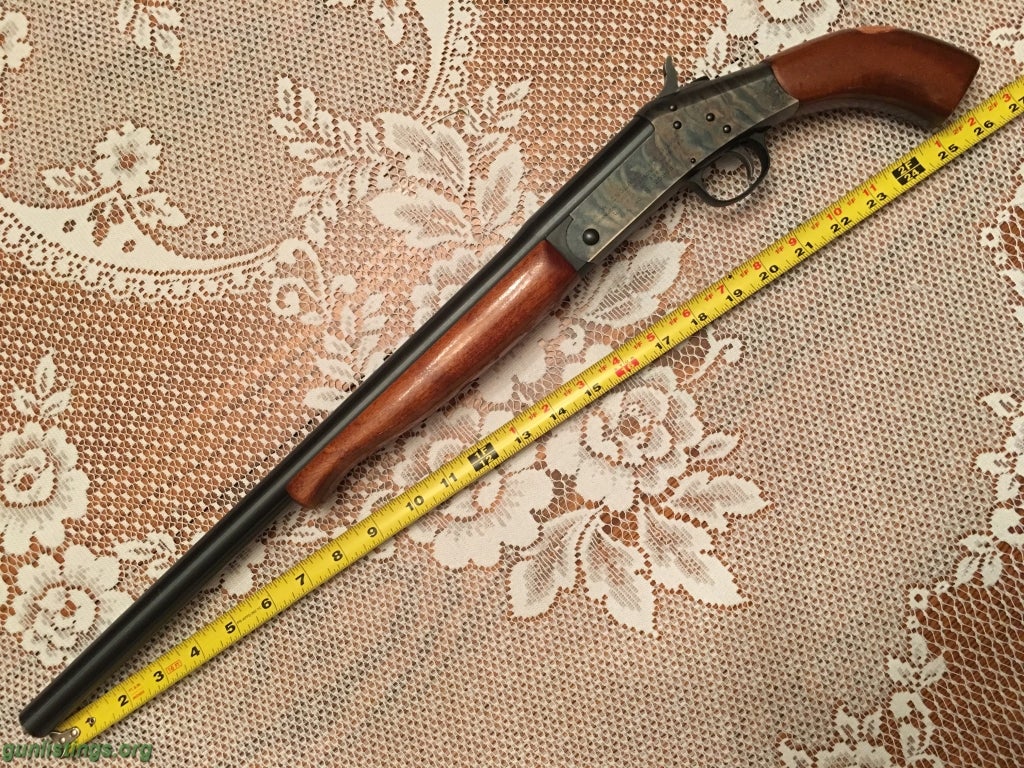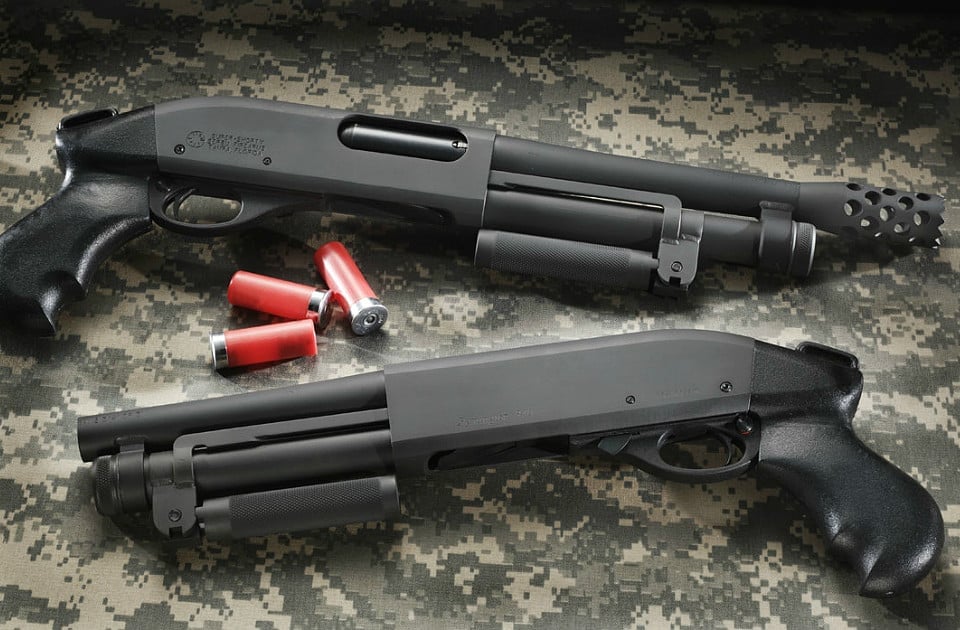The Shortest Legal Shotgun: A Comprehensive Guide
Discovering the shortest legal shotgun is a crucial topic for firearm enthusiasts and those looking to comply with legal regulations while optimizing their firearm choices. The legal landscape surrounding firearms can be complex, but understanding the rules governing short-barreled shotguns is essential for responsible ownership. This article aims to provide a detailed overview of the shortest legal shotgun, its legality, and how to ensure compliance with federal and state laws.
Firearm regulations vary significantly depending on jurisdiction, and what may be legal in one state could be restricted in another. For this reason, it's vital to stay informed about the latest laws governing short-barreled shotguns. This guide will explore the National Firearms Act (NFA), state-specific regulations, and other critical considerations to help you make informed decisions.
Whether you're a seasoned firearms collector or a newcomer to the world of shotguns, understanding the shortest legal shotgun will empower you to make responsible choices. This article will cover everything from the basics of firearm length requirements to advanced tips for compliance, ensuring you're well-prepared to navigate the complexities of firearm ownership.
Read also:Unveiling The Mysteries Of June 3 Zodiac Sign A Comprehensive Guide
Table of Contents
- Introduction to Short-Barreled Shotguns
- National Firearms Act (NFA)
- State-Specific Regulations
- Legal Length Requirements
- Types of Short Shotguns
- Process for Registration
- Benefits of Owning a Short Shotgun
- Common Misconceptions
- Tips for Compliance
- Future Trends in Firearm Legislation
Introduction to Short-Barreled Shotguns
Short-barreled shotguns, often referred to as "SBS," are firearms with a barrel length shorter than 18 inches or an overall length less than 26 inches. These compact firearms are popular among hunters, collectors, and law enforcement personnel for their versatility and ease of use. However, owning a short-barreled shotgun comes with specific legal obligations that must be met to ensure compliance with federal and state laws.
History of Short-Barreled Shotguns
The development of short-barreled shotguns dates back to the early 20th century, when they were primarily used by military and law enforcement agencies. Over time, their popularity grew among civilian users, leading to increased scrutiny and regulation. Understanding the historical context of these firearms provides valuable insight into why they are subject to such stringent legal requirements.
Why Choose a Short-Barreled Shotgun?
Short-barreled shotguns offer several advantages, including enhanced maneuverability and improved handling in confined spaces. They are particularly useful for home defense, tactical operations, and certain types of hunting. However, potential owners must carefully consider the legal implications before acquiring one.
National Firearms Act (NFA)
The National Firearms Act of 1934 (NFA) is a federal law that regulates the manufacture and possession of certain firearms, including short-barreled shotguns. Under the NFA, short-barreled shotguns are classified as "Title II" firearms, requiring specific registration and approval processes. Compliance with the NFA is mandatory for all firearm owners in the United States.
Key Provisions of the NFA
- Short-barreled shotguns must have a barrel length of at least 18 inches or an overall length of 26 inches unless registered under the NFA.
- Registration involves submitting Form 1 or Form 4 to the Bureau of Alcohol, Tobacco, Firearms, and Explosives (ATF).
- A $200 tax stamp is required for each registered firearm.
State-Specific Regulations
While the NFA sets federal standards for short-barreled shotguns, individual states may impose additional restrictions or prohibitions. It's crucial to familiarize yourself with state-specific regulations to ensure full compliance. Some states, such as California and New York, have stricter laws governing short-barreled shotguns, while others allow for more lenient ownership.
State Variations in Legal Requirements
For example, California prohibits the possession of short-barreled shotguns entirely, while Texas allows them with proper registration under the NFA. Understanding these variations is essential for responsible firearm ownership. Consulting local laws and regulations should always be a priority for potential owners.
Read also:Billy Milligan The Extraordinary Story Of A Man With 24 Different Personalities
Legal Length Requirements
According to federal law, a shotgun must have a barrel length of at least 18 inches and an overall length of at least 26 inches to avoid classification as a short-barreled shotgun. Any firearm falling below these dimensions requires NFA registration. These length requirements are designed to balance public safety with individual rights.
Why Are Length Requirements Important?
Length requirements serve to prevent the unauthorized possession of firearms that could pose a significant risk to public safety. By regulating the dimensions of shotguns, the government aims to strike a balance between accessibility and security. Owners must adhere to these guidelines to avoid legal consequences.
Types of Short Shotguns
There are various types of short shotguns available on the market, each with unique features and applications. Understanding the differences between these firearms can help you make an informed decision when selecting a short-barreled shotgun.
Popular Models and Manufacturers
- Mossberg 500 Cruiser: A compact shotgun designed for tactical use and home defense.
- Remington 870 Tac-14: Known for its durability and reliability, this model is a favorite among law enforcement agencies.
- Benelli M4 Super 90: A versatile shotgun used by military and police forces worldwide.
Process for Registration
Registering a short-barreled shotgun involves several steps, including completing the necessary paperwork, paying the required fees, and undergoing a background check. This process can take several months to complete, so it's important to plan accordingly.
Steps to Register a Short-Barreled Shotgun
- Submit Form 1 or Form 4 to the ATF, depending on whether you're manufacturing or purchasing the firearm.
- Pay the $200 tax stamp fee.
- Undergo a thorough background check.
- Wait for approval from the ATF, which can take up to six months.
Benefits of Owning a Short Shotgun
Despite the legal complexities, owning a short-barreled shotgun offers numerous advantages. Their compact size makes them ideal for use in confined spaces, while their stopping power provides effective protection against threats. Additionally, short shotguns are versatile tools that can be used for hunting, self-defense, and tactical operations.
Enhanced Maneuverability
The primary advantage of a short-barreled shotgun is its enhanced maneuverability. This feature makes it an excellent choice for home defense and tactical scenarios where space is limited. Users can quickly navigate tight corners and narrow hallways without compromising effectiveness.
Common Misconceptions
There are several misconceptions surrounding short-barreled shotguns that can lead to confusion among potential owners. Addressing these misconceptions is essential for promoting accurate information and ensuring compliance with the law.
Myth: Short-Barreled Shotguns Are Illegal
While short-barreled shotguns are heavily regulated, they are not illegal if properly registered under the NFA. Many people mistakenly believe that owning a short-barreled shotgun is prohibited, but this is not the case. Compliance with federal and state laws is the key to lawful ownership.
Tips for Compliance
Staying compliant with firearm regulations requires diligence and attention to detail. Here are some tips to help you navigate the complexities of short-barreled shotgun ownership:
- Consult with a qualified attorney specializing in firearm law.
- Stay informed about updates to federal and state regulations.
- Maintain accurate records of your firearm registration and ownership.
Future Trends in Firearm Legislation
As firearm legislation continues to evolve, it's important to remain aware of potential changes that could impact short-barreled shotgun ownership. Legislative trends suggest a growing emphasis on background checks and registration requirements, which may affect future regulations. Staying informed and proactive is the best way to ensure compliance and responsible ownership.
Predicted Changes in Regulation
Experts predict that future regulations may include stricter background checks, increased fees for registration, and expanded state-specific restrictions. Staying ahead of these changes will help firearm owners adapt to new requirements and maintain lawful possession of their short-barreled shotguns.
Conclusion
The shortest legal shotgun is a fascinating topic that combines elements of history, law, and personal responsibility. By understanding the National Firearms Act, state-specific regulations, and registration processes, you can ensure compliance with all applicable laws. Owning a short-barreled shotgun offers numerous benefits, but it also comes with significant responsibilities.
We encourage you to share this article with fellow firearm enthusiasts and leave a comment below with your thoughts and questions. Additionally, explore our other articles for more in-depth information on firearm ownership and regulation. Together, we can promote responsible firearm ownership and enhance public safety.


